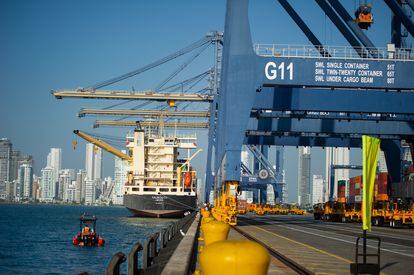A freight transport ship in the industrial port of Cartagena, Colombia, in February 2022. Sebastian Barros Salamanca (Getty Images)
Unlike the rest of the world, Latin America will grow more than forecast by the International Monetary Fund, according to its most recent
World Economic Outlook
report published on Tuesday.
The gross domestic product (GDP) of the region, including the Caribbean, will grow 0.5% more than estimated in its previous report published in April, reaching 3% this year, but it will grow less than forecast in 2023, the year in which Only 2% growth is expected.
"The risks to the outlook are overwhelmingly downward," says the multilateral report on the world economy, which will grow 3.2% - 0.4% less than anticipated -.
The world faces persistent rises in inflation, high interest rates and, in the case of emerging markets, heavy debt that is more difficult to pay against a dollar that is more expensive than domestic currencies.
“The war in Ukraine could lead to a sudden stoppage of European gas imports from Russia;
inflation could be harder to reduce than anticipated, either if labor markets are tighter than expected or if inflation expectations become unanchored;
tighter global financial conditions could lead to over-indebtedness in emerging market and developing economies,” says the report, prepared by its specialists.
The upward revision in Latin America comes "as a result of a more robust recovery in the large economies (Brazil, Mexico, Colombia, Chile)", says the report.
Meanwhile, the United States and China, the world's two largest economies, will grow less than anticipated.
In the case of the US, this has to do with a reduction in household income, while in China it derives from intermittent isolations due to covid-19.
As central banks in advanced economies raise interest rates to fight inflation, the Fund warns, financial conditions around the world will continue to tighten.
This means that issuing debt or obtaining credit is much more expensive.
This is already impacting the market.
A report published on Tuesday by the credit risk analysis firm, Moody's Investors Services, showed that the issuance of "high yield" bonds, that is, from countries and companies with low ratings and high risk of default, fell 47% between the first and second quarter of this year.
This, Moody's pointed out, is due to “tight financial conditions”.
The IMF revised global inflation upwards for this year, "due to food and energy prices, as well as persistent imbalances between supply and demand" It is expected to reach 6.6% in advanced economies and 9.5% in emerging market and developing economies.
This represents an increase of 0.9 and 0.8 percentage points, respectively, compared to its previous report.
In 2023, the Fund expects disinflationary monetary policy to take effect, with global output growing by just 2.9%.

